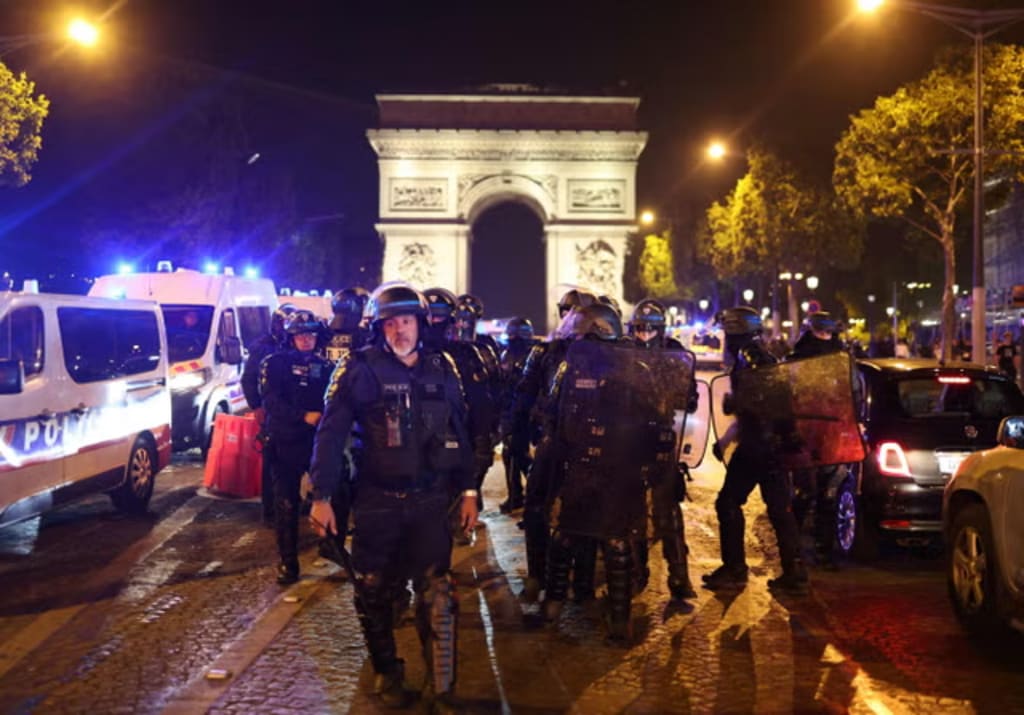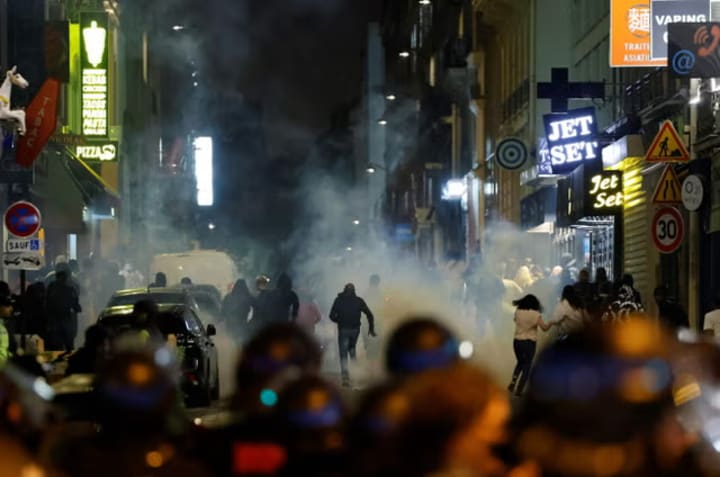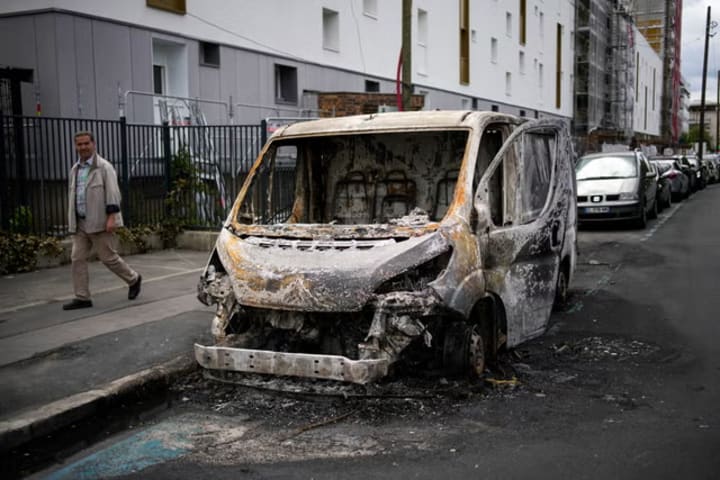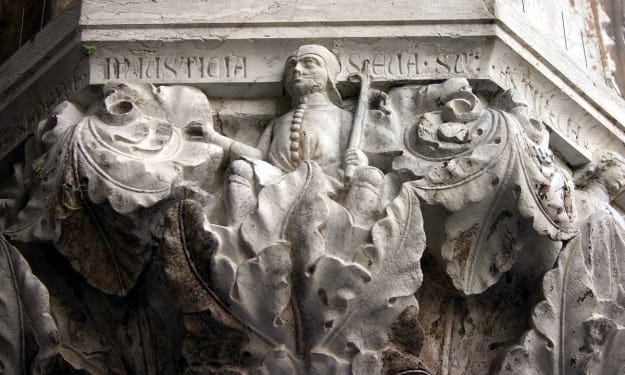Where are the riots in France and why are they happening?
Outrage over the 17-year-old teenager's shooting has spread to several locations.

Following an emotional weekend when mourners gathered for the funeral of a youngster whose death by police prompted widespread unrest, France has experienced its sixth night of violence.
Nahel Merzouk, a 17-year-old who had been shot dead by a policeman during a traffic stop on Tuesday and set off days of violent riots, was laid to rest in the Paris district of Nanterre.
Following the burial on Saturday, more than 700 people were detained as police in hotspot Marseilles used tear gas and engaged in late-night street skirmishes with protesters.
The interior ministry reports that 78 arrests were made nationally on Sunday, a significant decrease from the previous day's tally of over 3,000,
The events that contributed to nearly a week of mayhem on French streets are examined below.
What took place throughout the shooting?
Nahel Merzouk, a 17-year-old victim, was stopped for breaking traffic laws on Tuesday morning while operating a vehicle, according to the prosecution. The young person lacked the legal driving age in France.
According to the police's original report, the teenager was driving his automobile towards the officer when one of the officers opened fire. A video that went viral on social media instantly refuted this account of what happened.
The Nanterre prosecutor stated on Thursday that a timeline of events from Tuesday morning was being pieced together using witness testimony, CCTV camera evidence, amateur video footage, and statements from police officers.

Pascal Prache stated that at 7:55 a.m. on Tuesday, two motorcycle police observed a Mercedes with a teenage driver and two passengers moving swiftly through a bus lane.
Police gave the car two signals to stop and park, but the driver kept going, so the two officers pursued the car.
The Mercedes had to stop at a stop sign, and the police ordered the driver to switch off the engine and get out.
The police officers said that in order to prevent the driver from escaping in the car, they pulled their weapons and pointed them at him. The police then made the decision to open fire as the motorist started to pull away.
The automobile crashed after the driver was shot in the arm and chest. One of the travellers took off. At 8:21 am, firefighters were dispatched to the scene. The driver received first aid, but it didn't work.
According to Mr. Prache, the officer who fired the single shot claimed that he did so to stop the car from driving away and out of concern that he or another cop may be struck by the vehicle.
For shooting Nahel, the police officer is currently charged with voluntary homicide.
The prosecutor, Mr. Prache, claimed that following an initial inquiry, he came to the conclusion that "the conditions for the legal use of the weapon were not met."
How did the unrest start?
Nahel was a native of North Africa. The event has fueled ongoing protests from rights groups and the racially diverse suburbs that round France's major cities about police brutality and systematic racism within law enforcement.
Demands for more accountability have arisen as a result of several incidents involving deaths or injuries caused by French police in recent years. In response to the Minnesota police death of George Floyd, there were demonstrations against racial profiling and other forms of injustice in France as well.
The fatal shooting on Tuesday was the third such incident in France so far in 2023. According to a national police spokesperson, there were a record 13 similar shootings in the previous year.
Since 2017, there have been three similar homicides, two in 2020, and the majority of the victims have been Black or of Arab descent.
Tuesday night saw the beginning of clashes in and around Nanterre, a suburb of Paris where Nahel was killed. Some protestors tossed pyrotechnics at the police and lit up bins. On the crowds, police officers sprayed tear gas. On Wednesday, the administration sent out 2,000 police officers to keep the peace. But once night fell, the mayhem returned.

How far-reaching are the riots?
Throughout the week, there were conflicts between police and protesters all around the nation. The national police have recorded fires or skirmishes from Toulouse in the south to Lille in the north, although Nanterre and other Paris suburbs were the focal point of the unrest.
On Thursday, when 875 people were arrested, the government of Macron sent out 40,000 officers. On Friday night, 5,000 more officers were called into action, and more than 1,300 people were taken into custody—the most ever in a single night.
On Saturday, there were 700 additional arrests and the fifth night of countrywide unrest. With trained elite troops, armoured vehicles, and helicopters brought in to support its three main cities, Paris, Lyon, and Marseille, over 45,000 police were on the streets. Nevertheless, there didn't seem to be as much rioting, which Darmanin attributed to "the resolute action of security forces."
Since Nahel's passing, more than 3,000 people have been held in custody. Authorities have not said how many demonstrators have been hurt, although hundreds of police and firefighters have been hurt in the violence.
The turmoil has brought back memories of the riots in 2005, which shook France for three weeks and prompted Jacques Chirac, the president at the time, to proclaim a state of emergency.
Following the deaths of two young people who were electrocuted in a power substation as they hid from police, a wave of violence broke out in the Paris suburb of Clichy-sous-Bois and spread throughout the nation.
Ten years later, two officers were tried and found not guilty.
About the Creator
Phoenix Daily Conspiracies
"Whilst some people inspire, others conspire!"
Here to bring you all kinds of truths, although
don't believe what you read, do your research and keep your eyes wide open as the evidence is all around you.






Comments
There are no comments for this story
Be the first to respond and start the conversation.